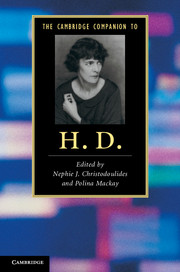8 - Hymen and Trilogy
from PART II - WORKS
Published online by Cambridge University Press: 28 November 2011
Summary
In her essay ‘Notes on Thought and Vision’ (1919), H.D. asserts her belief that a small community of individuals, ‘gathered together in the name of truth [and] beauty’, could change the world: ‘Two or three people, with healthy bodies and the right sort of receiving brains, could turn the whole tide of human thought.’ H.D.'s work suggests that she saw herself as a member of this group and believed in the revolutionary potential of poetry. In two of her major poetic works, Hymen and Trilogy, this belief is reflected in her revisionary portraits of women that challenge heteropatriarchy. While Trilogy (1944–6) is H.D.'s most discussed and highly regarded poem, Hymen (1921), her first substantial collection after the First World War, has received relatively little critical attention. Although Hymen shares with H.D.'s first collection, Sea Garden (1916), an interest in Greek Classicism, it signifies a distinct shift from the early work that established her as a poet and cemented her reputation as ‘H.D. Imagiste’. Most importantly, Hymen moves away from a focus on flowers and landscape to offer the first fully realised example of the emphatically woman-centred poetry for which H.D. has become known: its free-verse lyric poems are preoccupied with revising patriarchal images of women. Thus, in terms of both content and technique, Hymen is an important precursor to Trilogy, an epic poem that offers a spiritual response to war principally through the recuperation of biblical women, particularly Mary Magdalene. Together, these two texts exemplify H.D.’s poetic strategies and explore her main concerns: female identity and the impact of war on the modern world.
- Type
- Chapter
- Information
- The Cambridge Companion to H. D. , pp. 113 - 126Publisher: Cambridge University PressPrint publication year: 2011



